KARACHI: Pakistan Stock Exchange above the 98,000 mark on Friday as share prices surged more than 2,000 points in intraday trade
WASHINGTON: US President Donald Trump’s offer to mediate between India and Pakistan over the Kashmir dispute might have prompted New Delhi to annex the occupied valley, says a report prepared for the US Congress.
The Congressional Research Service (CRS) noted that on July 22, 2019, while taking questions from the press alongside Prime Minister Imran Khan in the White House, President Trump claimed that Indian Prime Minister Modi had earlier in the month asked him to play a mediator’s role in the Kashmir dispute.
Mr Trump’s statement provoked an uproar in India’s parliament, with opposition members staging a walkout and demanding explanation, forcing the Indian government to assure the opposition that Mr Modi never made such an offer.
Yet, “President Trump’s seemingly warm reception of Pakistan’s leader, his desire that Pakistan help the United States 'extricate itself' from Afghanistan, and recent US support for an International Monetary Fund (IMF) bailout of Pakistan combined to elicit disquiet among Indian analysts,” the report added.
Indian leaders “saw Washington again conceptually linking India and Pakistan, 'wooing' the latter in ways that harm the former’s interests,” CRS noted, adding that President Trump’s Kashmir mediation claims were especially jarring for Indian observers, “some of whom began questioning the wisdom of Mr Modi’s confidence” in the United States as a partner.
“The episode may have contributed to India’s August moves” to annex Kashmir, CRS added.
Although President Trump never withdrew his mediation offer, the strong Indian reaction forced the US State Department to post a clarification on the social media, stating that Washington still saw Kashmir as that “a bilateral issue for both parties to discuss” and the Trump Administration “stands ready to assist.”
A release from Chairman of the House Foreign Affairs Committee Representative Eliot Engel reiterated his support for “the longstanding US position” on Kashmir, affirmed that the pace and scope of India-Pakistan dialogue is a bilateral determination, and called on Pakistan to facilitate such dialogue. In its second report on Kashmir in less than six months, CRS also noted that many in India disagree with the Modi’s government’s “blanket characterisations of the Kashmir conflict as an externally fomented terrorist.”
They argue that such characterisations “obscure the legitimate grievances of the indigenous Muslim-majority populace,” the report added.
CRS noted that critics of the Modi government believed it was working on a “Hindu nationalist agenda” to change the status of the occupied valley.
The critics argued that “its policy agenda entails bringing the patriotism of Indian Muslims into question and portraying Pakistan as a relentless threat that manipulates willing Kashmiri separatists, and so is responsible for violence in Kashmir,” the report added.
CRS, an independent research wing of Congress, prepares periodic reports for US lawmakers so that they can take informed decisions on major international issues. Currently, two resolutions are pending in the House of Representatives that question India’s Aug 5 decision to annex Kashmir. One of the resolutions was sponsored by Indian-American Congresswoman Pramila Jayapal who also criticizes the Modi government’s anti-Muslim policies.
The CRS report pointed out that supporters of New Delhi’s Hindu nationalist agenda oppose a negotiated settlement of the Kashmir dispute.
In their view, “talking to Pakistan cannot resolve the situation, nor can negotiations with Kashmiri separatist groups and parties, which are seen to represent Pakistan’s interests rather than those of the Kashmiri people,” the report added.
Quoting independent observers, CRS reported that blanket characterisations of the Kashmir conflict as an externally fomented terrorist effort endorses a “harsh counterinsurgency strategy that … has only further alienated successive generations in the Valley.”
Those who reject the Modi’s government’s narrative, argue that “Kashmir’s turmoil is, at its roots, a clash between the Indian government and the Kashmiri people, leading some to decry New Delhi’s claims that Pakistan perpetuates the conflict,” the report added.
CRS reported that pro-independence political parties on both sides of the Line of Control were given little room to operate, and because of this many Kashmiris had become deeply alienated.
The 25-page report said that Pakistan called for a UNSC session and, with China’s support, the Council met on Aug 16 to discuss Kashmir for the first time in more than five decades.
CRS noted that “India’s self-image as a regional leader in no need of assistance” prevents it from accepting third-party mediation on Kashmir.
You May Also Like
TEHRAN: The head of Iran’s Revolutionary Guards described the arrest warrant issued by the International Criminal Court for Israeli Prime
LOWER KURRAM: The death toll in yesterday’s gun attack on passenger vans in Khyber Pakhtunkhwa’s Lower Kurram has risen to 42,






